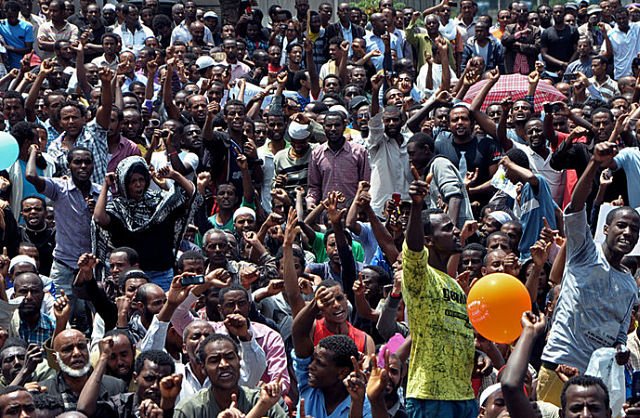 Thousands of Ethiopian opposition activists demonstrate in Addis Ababa on June 2, 2013. The demonstrations were organized by the newly formed Blue Party opposition group. (AFP/Getty Images)
Thousands of Ethiopian opposition activists demonstrate in Addis Ababa on June 2, 2013. The demonstrations were organized by the newly formed Blue Party opposition group. (AFP/Getty Images)
By Gregory Warner
Feven Tashome is a study in blue. The 21-year-old’s toenails are painted a rich cobalt, her scarf is baby blue and her leather handbag is ultramarine. To ordinary passersby in the Ethiopian capital of Addis Ababa, it’s a fashion statement; to members of Ethiopia’s beleaguered political opposition, it’s a secret handshake.
Feven (Ethiopians go by their first names) is showing her allegiance to an opposition party with an odd name, and an even odder theme song.
The Blue Party is one of Ethiopia’s few remaining opposition parties. Ethiopia is technically a multiparty parliamentary democracy, like Britain, but it is effectively run like a one-party state, with 99.8 percent of parliamentary seats controlled by one ruling party, the Ethiopian People’s Revolutionary Democratic Front, or EPRDF.
After the Blue Party was founded three years ago, it organized a peaceful anti-government protest in a country that hadn’t permitted public rallies for a decade. The parade of young Ethiopians demonstrating in jeans and blue T-shirts seemed a sign that the government was relaxing its grip. But with new elections this May, the Blue Party claims that subsequent rallies have been met violently by police. They say hundreds of their delegates have been fired from their jobs or beaten up by thugs.
Blue Party spokesman, 27-year-old Yonatan Tesfaye, says blue is a symbol of two powerful unifying images for Ethiopians: the Blue Nile, and the Red Sea (which is actually turquoise most of the year). Blue is also the color of Twitter and Facebook; social media are one of the last remaining outlets for relatively uncensored expression in the country.
But to the Ethiopian government, “blue” is a symbol of rebellion, like the “Orange Revolution” in Ukraine or the failed “Green Movement” in Iran.
—
Join the conversation on Twitter and Facebook.

























